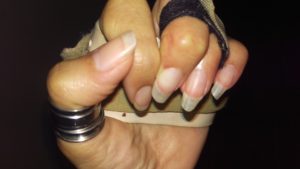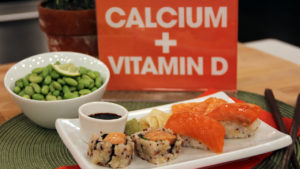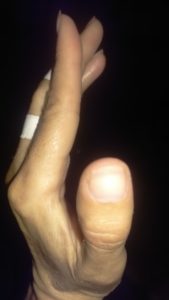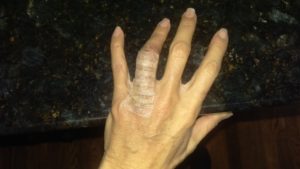A Personal reflection!
As many of my friends and clients know, I have been dealing with a broken finger on my left hand. I have had multiple surgeries, the last being at end of 2017. Not happy with the result. First words from orthopedics mouth were my bones are in a disastrous state. Really, me, fitness model (well almost, right, lol), nutrition expert (we all know what that means, right?) and even “the professor.” Well, needless to say, pain and bone issues are persistent. My checklist of appropriate solutions has run out. Second opinion – check (still bad bones), hand therapy – check, keeping food logs – check. Ok, last on the list… stay tuned!
Well, just to reflect on the nutrition side of what’s going on here. Perfect nutrition – mmm…. wasn’t that one checked off years ago? So yes, you got me. It was, but it is vital to mention here that one person’s perfect nutrition may be another’s disaster. Nutrition is a very individual concept, and although I know a tremendous amount about the science of metabolism and the value of food as medicine, I am also learning new breakthroughs all the time. I have been teaching clinical nutrition in Life University’s Graduate program for a year or so now. My personal reflection: It turns out, that based on the caloric intake for my individual basal metabolic rate, I am one who at this stage of life and training, a calcium supplement and vitamin D compliment may prove to be essential within my profile. Supplements are not necessary for everyone, and I still work off of the principle that food is one’s most bioavailable source of nutrients and the best medicine for most ailments. Supplements are just that – supplements. And by definition: “to supplement one’s diet in which it lacks.” Not a replacement of good sources of nutrients through food.
So with that said, this may be the perfect place to write about calcium and bone strength:
The science behind my experience:
Bones have a dual function in the storage and use of calcium. Not only do they serve as a reserve tank to replenish blood calcium, but they act as a storage depot for the calcium collected during the growing years. The downside to this, is that as the tank releases calcium into the blood as needed, the bones weaken. After growth, calcium cannot be put back into the bones, and thus the reserve gets depleted as calcium is needed in the blood for its daily functioning. Calcium balance is therefore determined by the intake of calcium through diet to maintain a high blood calcium level and furthermore, to prevent loss of calcium from bones. It is also important to note though, that an intake of excess calcium, does not result in increased calcium retention.
A stress fracture is defined as a partial or complete bone fracture, resulting from the bone not being able to withstand a certain stressor, such as over pounding over time. An accumulation of bone damage which is not adequately repaired simultaneous to decreased bone strength increases the risk of stress fractures.
So Doc… what are you telling me. I do not eat enough calcium? Do I over train? My bones are weak? Unfortunately, with a history of disordered eating, genetics and a endurance training regimen, all of the above play a role. Athletes on low calorie intakes, are likely to have low blood calcium levels, and are at a high risk for bone calcium loss and osteoporosis.
Sound familiar to any of you? … especially female athletes that struggle with their relationship to food? Long term consequences of low calorie intakes, amenorrhea (defined as non existent menstrual cycle for more than 6 months) should consult a sports dietitian (as in, me ;-)) or a sports physician for an assessment. Prevent irreversible bone loss before it is too late. An assessment of calcium intake will be performed. Just some inside information here, a minimum of 800mg per day will be recommended. Furthermore, for females that do have amenorrhea, 1500 mg/day may be recommended. Anything over the daily recommended intake of calcium warrants a calcium supplement. Postmenopausal women athletes are also safe to be on a 1500mg/day calcium regimen. During adolescence, or better described in this case as bone density peaking years, it is essential that athletes get an adequate calcium intake to ensure a maximum reservoir of calcium in the bones throughout life. Excessive sodium, protein and caffeine increase calcium loss, these will therefore be assessed and tweaked in your daily diet as well.
In summary, the following lifestyle changes can help maintain an optimal calcium level in both blood for daily functioning, and bones for maximum reserves:
- Under circumstances where dietary calcium requirements cannot be met, a calcium supplement is warranted. Be aware that supplemental calcium is not as bioavailable as calcium from food. Calcium supplements are particularly warranted for people who are lactose intolerant, dislike or are allergic to dairy products, or cannot meet calcium requirements through dietary means in general.
- People whose daily diet is too high in protein, sodium and/or caffeine may also benefit from calcium supplementation, although reducing these calcium inhibitors may be a more healthy and appropriate solution.
- Taking calcium at bedtime and without food (between meals) may increase the bioavailability because the interference of calcium inhibitors in natural food are hereby prevented (eg. Phytic acid and vitamin C).
- Maintaining a recommended vitamin D intake is also essential for bone health. Not only does vitamin D increases the absorption of calcium but it also is an essential nutrient that makes up bone structure and bone density. The most bioavailable source of Vitamin D is sunlight. People with minimum exposure to the sun warrant a Vitamin D supplement. Vitamin D supplements are also recommended when Calcium supplements are prescribed, since both these nutrients increase the absorption of the other.
- Regular weight bearing exercises has a positive role in maintaining bone density. Lifting weights is thus vital as a cross training regimen to ensure optimal bone density while endurance training. Other ideas for cross training could include ground reaction forces, such as running, tennis, aerobics and any court sports (stop-start motions) since the ground reaction has a greater effect on bone density than non-ground reactive sports such as swimming and cycling.
- Some research has found that calcium supplements are best absorbed in doses of 500 mg or less, thus splitting high supplemental doses into 2 or 3 intakes a day is recommended.
References:
- Clinical Sports Nutrition. Louise Burke and Vicki Deaken. 3rd Edition. McGraw and Hill publishers.
- Heaney RP et al. Variability of calcium absorption. Am J Clin Nutr, 47:262-4.
- Bennell et al. Risk factors for stress fractures in female athletes. Clin J of Sports Med. 5:229-3





